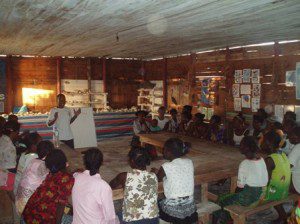By Sean Clement, Blue Ventures Field Scientist. One of the most encouraging aspects of the success of Blue Ventures’ work in the Velondriake marine protected area (http://www.livewiththesea.org/) has been the extent to which many of Velondriake’s approaches to conservation have been replicated by other communities in Madagascar. Throughout the south and west of this vast country, as in so many coastal areas of the tropical developing world, communities are concerned with the declining health of their coral reefs and marine resources. Consequently, many of Blue Ventures’ NGO partners are supporting communities to follow similar approaches to Velondriake, implementing marine monitoring programmes and creating community managed permanent marine reserves like Velondriake. Along many hundreds of kilometres of coastline, from Morondava to Fort Dauphin, villages are following the Velondriake communites’ lead and engaging with the task of protecting their marine resources.
 In the remote village of Itampolo, some 400km south of Velondriake, the local community have been working with Blue Ventures, WWF and Madagascar’s National Parks authority to build marine reserves to help protect dwindling fish stocks. Working with the WWF since 2008, this fishing village’s population of 2000 is acutely aware of the marked decline of local reef systems in recent years. Village elders speak of the impact of coral bleaching on the reefs and the declining catches that fishermen bring back to the village.
In the remote village of Itampolo, some 400km south of Velondriake, the local community have been working with Blue Ventures, WWF and Madagascar’s National Parks authority to build marine reserves to help protect dwindling fish stocks. Working with the WWF since 2008, this fishing village’s population of 2000 is acutely aware of the marked decline of local reef systems in recent years. Village elders speak of the impact of coral bleaching on the reefs and the declining catches that fishermen bring back to the village.
For the past fortnight, we’ve been working in Itampolo training and supporting WWF conservationists in marine surveying, helping build their capacity to develop a better understanding of the health of the region’s coral reefs. It’s been a tough schedule of daily research diving and data analysis, the results of which will go towards helping advise communities to develop zoning plans for the protection of their local reefs.
Itampolo’s coral reefs are located less than 2km offshore, and surrounded by deep waters that are often too treacherous for all but the hardiest of pirogues, meaning that the reefs are often the only option for a day’s catch. Reef surveys tell a tale of heavy exploitation; sloping banks of coral rubble bereft of all but the smallest fish along with encroaching macro-algae out-competing and smothering all other life as far as the eye can see. Seeing degradation on such a massive scale it’s hard not to be struck by the magnitude of the marine crisis facing Itampolo’s fishermen.
Despite these desperate appearances, there is hope. The Itampolo community is close to creating its first locally managed marine reserve, which it hopes will bring about localised recovery of these threatened reefs. Experiences further north in Velondriake have shown how rapidly reefs in this region of the Mozambique Channel can recover, and demonstrate the powerful ecological resilience of these critical important ecosystems. Given time, and continued support from committed partners like WWF, we can hope that when Blue Ventures next returns to survey these reefs, we’ll be able to share a story of reef recovery.

